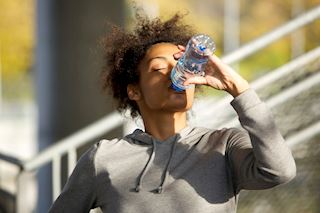Eat More Will You? A Guide To Marathon Nutrition For Women Runners
I am going to tell you something you aren’t going to like very much; you have to eat more. As women, we are often trained that less is more when it comes to what we put in our mouths. Unfortunately, many women hit the pavements to either lose weight, or to maintain it by collecting miles. If you are going from causal runner to marathon elitist, you are going to have to do something that goes against all that your brain will tell you. You are going to have to increase your food intake to a more healthy level.
Endurance runners put a lot of strain on the body. The truth is that a body was not made to put up with that type of mileage on weekly basis, so you are asking your body to do things that may not be completely healthy. What you need to do in return, is to supply it with the nutrients to stay strong longterm. The mistake that most marathon runners make is to up their workload and not compensate by giving the body the tools to repair and replenish. Not only is it imperative that you be mindful of proper hydration, but you also have to increase your calorie intake slightly and make food choices that may not be ones that you would typically make.
Any time that you use a muscle to do work, what you do is put tiny tears in the fiber. It is these small tears that force the muscle to rebuild and to regenerate. Every time you cause tears in a muscle, it makes it stronger. Hence, no pain, no gain. The problem is that the muscle fiber needs the right ingredients and the necessary time to heal and gain strength. If you don’t give it both, it could lead to disastrous consequences. Overtraining and injury are likely to happen if you don’t take the steps to aid your body to do what it is supposed to do. In essence, you have to help your body to help you.
To build lean muscle mass, which is essential for muscle endurance and strength, you need to alter your nutrition in the following way.
Up your intake
That does not mean that you have to go for that second piece of cake. Upping your caloric intake is only effective if you eat the right types of food to compensate for the energy you are burning. If you are going to increase your mileage, you are going to need approximately an additional 100 calories for each 5 miles that you run daily. Those extra calories should be in the form of protein or good fats, to help the body do its work. It will also be necessary for you to up your intake of electrolytes, especially on those days when you go for long runs or when it is excessively warm outside. Electrolytes are what keeps your body electricity working, literally. Consider drinking sports drinks with added electrolytes, but don’t be fooled by the ones that are comprised mostly of sugar.
Add additional 100 calories for each 5 miles that you run daily
Protein is essential
Protein is the building block of the muscle. Without it, a muscle can not build or repair. If you are increasing your mileage to train for a long race, it is critical that you increase your protein intake. Lean proteins such as chicken, turkey or fish are going to be your best bets. Fish will give you the additional benefit of Omega-3 fatty acids, which help with joint health. Beef and pork are good too, just use them more sparingly. If you are not a “meat lover” you can get protein from dairy, tofu, eggs, beans or legumes just as effectively. Just make sure to increase protein by a minimum of 10% of your daily intake when going long distances.
Fat is good
I know that statement probably set you back a bit. We have been told for so long that fat makes you fat, that most of us prefer pretzels, which are nothing more than sugar to the body. When you are training for a marathon, it is essential that you up your intake of good fats. They not only help with muscle repair, but they also contribute to give you more energy and to encapsulate the muscles for more protection. Stay away from saturated or trans fats, those are the enemy. Load up on unsaturated fats that can be found in olive oil, nuts, fish and lean meats. Retrain your brain to stop making fat the enemy. In fact, there is scientific research to prove that the absence of fat in our diets is what is making us fat.
Potassium
Getting enough potassium is essential for runners. Potassium is necessary for muscle strength and to stave away those troublesome cramps that can keep any runner off the trail. It also works to balance electrolytes and will keep your running harder and longer than without it. A banana, squash, or yogurt are great ways to get all that you need.
A multi-vitamin
Likely, you are going to burn more than you can keep up with when going long distances. It is important that you consider supplementing with a multivitamin when you increase your run load. Vitamins and minerals from a balanced diet is always the prefered option. But if you struggle to get all that you need with just the foods that you eat, so give your body the additional energy it needs by supplementing with those things that will help it to stay strong.
If you want your body to do things for you like run longer, train harder and recoup faster, you have to do things for it. Follow the nutritional guidelines above and you and your body can work together to achieve your goals without insult or injury.












